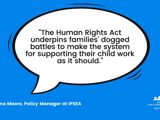The right to life may be relevant when the life of child or young person is known to be at immediate risk or if they are at risk of taking their life.
Ella Adoo-Kissi-Debrah was a nine-year-old girl who lived with her family near a busy London road. She was hospitalised nearly 30 times in three years for asthma-related issues. She died in 2013 as a direct result of air pollution. Her family argued that the Government failed to uphold Ella’s right to life by allowing dangerously high levels of pollution, and their lawyer said “I think it entirely possible in relation to those people who have been affected by air pollution that they could use the Human Rights Act to try and enforce their right to breathe clean air.”



